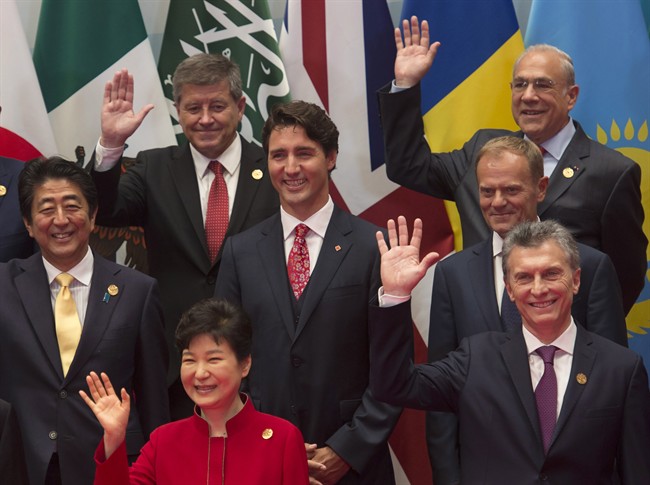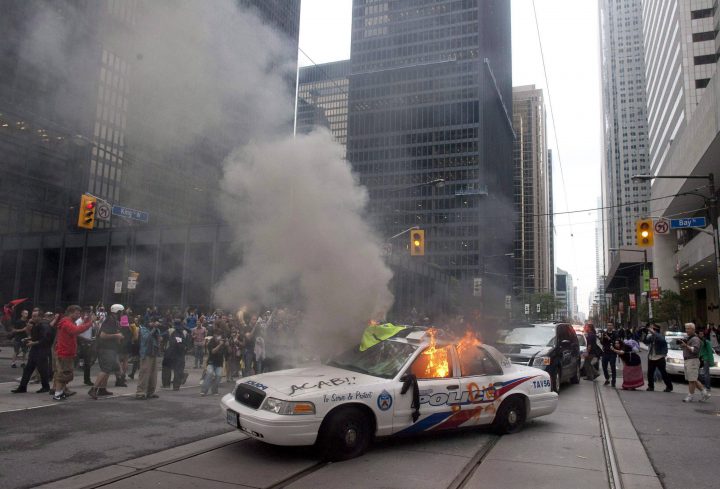Protesters are taking to the streets in Hamburg, Germany for the Group of Twenty (G20) Summit, and it’s not the first time the world leaders’ summit has attracted demonstrations.

LATEST UPDATES: G20 protests mark chaotic, violent start to international summit
The annual summit, which consists of a series of formal and informal meeting between world leaders, often results in protests by advocacy groups calling for change on a variety of topics such as environmental policies, trade deals and labour laws.
Julia Kulik, a researcher with the University of Toronto’s Munk School of Global Affairs, says most international summits attract similar protests.
Why do the events attract protests?
The protests centre around an idea of “corporate greed and anti-capitalist views,” Kulik said.
“The G20 was founded to make globalization for the benefit of all,” said Kulik, but after actions such as big-bank bailouts the public became less confident that the summit is “for the people.”
Kulik adds that many protesters want the summit to expand its agenda beyond “traditional economic issues” and address issues affecting the poor.
Transparency issues
There is often a lack of trust in government leaders to make decisions in the best interest of the public, and that is heightened by the fact that many of the summit’s meetings are private.

“Seeing 20-21 people making decisions that affect the entire world is not appealing to a lot of people,” she said, explaining that the public wants to see the “path to reaching decisions.”
Summits are often held in countries that lack press freedom, meaning news coverage of the summit can be limited or censored. Journalists at last year’s summit in China were detained, Kulik pointed out.
What has happened at previous G20 summits?
- Train goes up in flames while rolling through London, Ont. Here’s what we know
- Wrong remains sent to ‘exhausted’ Canadian family after death on Cuba vacation
- Liberals having ‘very good’ budget talks with NDP, says Freeland
- Peel police chief met Sri Lankan officer a court says ‘participated’ in torture
Protests are generally a part of world leaders’ meetings, but high-profile summits attract the most demonstrations.

In 2009, the G20 Summit in London, U.K., grew tense when riot police charged on a sit-down protest in the city centre. An estimated 4,000 people demonstrated in the city’s financial district before the summit even began. Following the summit, there were allegations of police brutality on protesters, and several officers were reprimanded.
A year later, the summit drew a similar scene in Toronto, when protests erupted through the city. The protests and large police presence led to the largest mass arrest in Canadian history, with more than 1,000 people sent to a detention centre. A report later found that police violated civil rights and detained some protesters illegally.
While every G20 meeting attracts protests, not all become violent or controversial.
READ MORE: Toronto G20 police misconduct case delayed after complainant axes lawyer
Protests were relatively peaceful at the 2014 Brisbane summit, Kulik says, explaining that location often plays a part in how heated demonstrations become. Australia is geographically isolated, meaning many people can’t easily travel there.
What is expected at this year’s G20 meeting?
About 4,000 marched through Hamburg Sunday, protesting climate and trade policies of the world’s largest economies.
The demonstration, which also saw protesters take to the water with a flotilla of hundreds of small boats, was organized by environmental, labour, human rights and church groups.
WATCH: Anti-G20 protests begin in Hamburg

Authorities are putting in place tight security and declaring certain areas of Hamburg off limits to protesters during the July 7-8 summit. According to The Telegraph, about 20,000 officers will be on guard for potential terror attacks, or should protests turn violent.
Kulik says it is possible things will escalate further because Germany is easily accessible to protesters from around Europe.
“Because of Germany’s history, it’ll be very hard to stop people from assembling,” the researcher says, noting that the country likely won’t want to be seen as limiting freedom of speech or demonstration.
— With files from The Associated Press











Comments